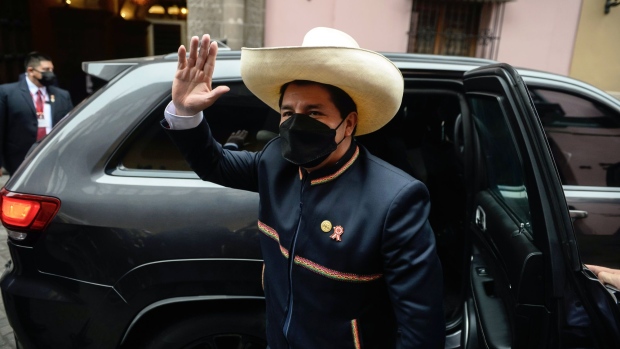Dec 6, 2021
Peru’s Leftist President Braces for Early Attempt to Impeach Him
, Bloomberg News

(Bloomberg) -- With his approval rating plunging and with few allies in congress, Peru’s leftist President Pedro Castillo this week faces a vote to start impeachment proceedings against him.
Just five months into his presidency, the unicameral congress will decide Tuesday whether to try to oust Castillo under the constitution’s loosely defined “moral incapacity” clause.
The initial motion would need 52 votes, or 40% of the 130-member legislature, to pass, which would allow the impeachment debate proper to go ahead. Last week, La Republica newspaper reported that it had the backing of 50 lawmakers.
Removing presidents in Peru is easier than almost anywhere else on earth. Castillo could be gone if 87 lawmakers -- a two-thirds majority -- opposed him in an impeachment vote. Former President Martin Vizcarra was impeached last year, and nearly every Peruvian president elected since 1985 has been impeached, imprisoned or sought in criminal investigations.
Read More: Impeached, Jailed, Wanted: President Is a Dangerous Job in Peru
“The latest development suggests that the situation could be rapidly moving from the current confrontation scenario into one of institutional rupture that leads to a premature departure” of Castillo, Barclays analysts Alejandro Arreaza and Juan Prada said in a research note last week.
Political instability is undermining gains from improving terms of trade and business confidence, according to Barclays. Last year, Peru suffered one of the world’s deadliest and most economically-destructive Covid-19 outbreaks.
If Castillo were to leave office, his running mate, Dina Boluarte, would be first in line to succeed him.
Without a majority in congress, Castillo’s position has never been strong since he took office in July. But a series of scandals -- one involving his chief of staff who allegedly hid $20,000 in a bathroom at the presidential palace -- has further weakened his position.
In a speech to the nation last week, Castillo said he was being attacked by a minority elite for being a farmer and schoolteacher demanding structural changes.
“The goal is to vacate the president without any basis and with absolute irresponsibility for the consequences these antidemocratic acts have for the population,” he added.
High Risk
Peruvian presidents without a majority in congress face a high risk of being ousted on a variety of pretexts for so-called moral incapacity, said Carlos Melendez, a partner at Peruvian consultancy 50+1 Grupo de Analisis Politico, speaking by phone.
If the motion passes, Castillo or his lawyer will have to appear before congress to defend himself, after which lawmakers would vote.
Castillo could survive if he manages to rally at least 44 lawmakers behind him, and his own socialist Peru Libre party holds 37 votes. Party leader Vladimir Cerron has recently become estranged from Castillo but, despite this, he said in a tweet on Monday that he won’t back the impeachment motion.
Cerron and Castillo are scheduled to meet at the presidential palace on Monday, and the president will also meet some other party leaders.
Read More: Peru President Picks Moderate Cabinet Criticized by His Party
Poll Numbers
A poll by Instituto de Estudios Peruanos for La Republica published Nov. 28 gave Castillo an approval rating of just 25%, down 10 percentage points from a month earlier. The impression that his government is in a free-fall gives parties on the right reason to play to their electorate and support impeachment, Melendez added.
Still, “there is a perception that the majority of political forces of the country wants to give Castillo more time and, additionally, the country doesn’t want another episode of political instability” amid what could still be a grace period early in his term, said Claudia Navas at political risk consultancy Control Risks in Lima.
Navas says the president will survive this first attempt to unseat him. A majority of Peruvians don’t support impeachment, according to the poll published by La Republica.
©2021 Bloomberg L.P.






